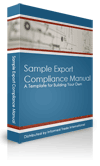Dual Use Export Licensing Under the EAR Under the Export Administration Regulations (EAR), the Bureau of Industry and Security – of the US Department of Commerce – regulates the export of commercial items that have both commercial and military applications, or that otherwise have strategic value to the United States. These items are commonly […]
Posted on January 4th, 2017 by admin
Filed under: EAR, ITAR | Comments Off on Dual Use Export Licensing Under the EAR
Under both the International Traffic in Arms Regulations (ITAR) and the Export Administration Regulations (EAR), the ability of persons or entities to release of controlled technology and technical data to foreign persons (including those physically located within the United States) is significantly limited without relevant licensing and/or authorization. Importantly, these limitations apply to the […]
Posted on November 29th, 2016 by admin
Filed under: EAR, ITAR | Comments Off on Deemed Export Regulations: Introduction
Licensing or other authorization is not required in situations where the technology or technical data is controlled for export/release to foreign persons. Technology or technical data that is not controlled is therefore exempt from EAR and ITAR licensing and authorization requirements. It is worth noting that the EAR governs controlled technology, and ITAR governs […]
Posted on November 29th, 2016 by admin
Filed under: EAR, ITAR | Comments Off on Deemed Export Regulations: Controlled Technology and Technical Data
A foreign person is any: Person who is not a US Citizen, US permanent resident, legal refugee, or other similarly-authorized individual; Employees on H1B1, H1B, L1, and O1A visas are therefore considered foreign persons under EAR and ITAR. This can increase the administrative overhead quite substantially if you and your organization are unprepared. Entity that […]
Posted on November 29th, 2016 by admin
Filed under: EAR, ITAR | Comments Off on Deemed Export Regulations: Who Qualifies as a Foreign Person?
Release need not be concerted, voluntary, or even intentional. Conduct qualifying as a “release” under EAR and ITAR includes, but is not limited to: a) allowing a foreign person to visually inspect or otherwise view the technology or data; and b) oral discussions, whether over the phone, through a video-conferencing program, or in-person. Under […]
Posted on November 29th, 2016 by admin
Filed under: EAR, ITAR | Comments Off on Deemed Export Regulations: What Constitutes a Release?
Though most technology and technical data is not controlled for export or release to foreign persons, entities, and governments, if the technology or technical is in fact controlled, then a license may be required. To ensure that such technology/data can be released or exported to foreign persons, the petitioner must apply for a license […]
Posted on November 29th, 2016 by admin
Filed under: EAR, ITAR | Comments Off on Deemed Export Regulations: Licensing and Other Compliance
The EAR and ITAR subject violators to separate fines for violations, which – depending on criminal or civil liability – can run up to $1M or $250K per violation, respectively. How does this work? Suppose that (without a license) you accidentally send design documents for controlled technology to a foreign client. It was a […]
Posted on November 29th, 2016 by admin
Filed under: EAR, ITAR | Comments Off on Deemed Export Regulations: Punishment
Effects of the New Rules The BIS and State Department intend for these DCS revisions to have significant positive effects on exporters, and on export regulation generally. Specifically, their hope is that the final rule revisions will help minimize the compliance burden for exporters, and the complexity of the export control process overall. Recipient […]
Posted on September 1st, 2016 by admin
Filed under: EAR, ITAR | Comments Off on Effects of the New DCS Rules
The final rules issued by the BIS and State Department – and effective as of November 2016 – alter the text of the existing EAR and ITAR regulations to better harmonize their separate DCS requirements. Commercial invoice only. The new rules no longer require a DCS on several different export control documents. Instead, under […]
Posted on September 1st, 2016 by admin
Filed under: EAR, ITAR | Comments Off on Changes Made to Harmonize the DCS provisions
How is the pre-existing DCS paradigm frustrating for exporters? The purpose of a DCS is to notify international parties as to the compliance of the exported defense article with applicable EAR and ITAR regulation, and to ensure that the relevant parties are further notified as to the illegality of diverting the exported article. […]
Posted on September 1st, 2016 by admin
Filed under: EAR, ITAR | Comments Off on How is the pre-existing DCS paradigm frustrating for exporters?


